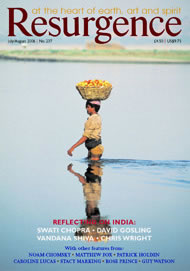I LOVE BOOKS that start hares running in the mind. One of the long-legged creatures set loose in Jay Griffiths’ brilliant, mercurial Pip Pip: A Sideways Look at Time was not a hare but a ‘here’. It was a passing comment on the importance of the little word hic (‘here’) in the poetry of Virgil. This hare/here then collided with something else: the repeated image of people on mobile phones, not really occupying the space they are in, anxiously leaning towards another place (which may itself be a non-place), and impeding the flow in the here and now.
Like Jay Griffiths, I am a fan of Virgil’s Georgics. I recently took another look at these four poems on country matters while researching an article that sought to enlist Virgil, apparently an imperialist cheerleader, on the side of peace. Griffiths was absolutely right: the little word hic popped up everywhere, carrying far more weight than I’d imagined. When in the great celebration of the beauty of Italy in ‘Georgic 2’ Virgil writes “here is eternal spring”, speaking of the blessedly temperate Italian climate, the ‘here’ matters as much as the eternal spring. “Here”, in this place, this beloved place, and no other.
Inspired by Griffiths, I started to think about other Latin poets with a passion for ‘here’. One of the first Latin poems I ever read is a joyous celebration of a beloved ‘here’. In his little ode about returning from arduous foreign duties to the peninsula of Sirmio on Lake Garda, Catullus speaks of a ‘here’, which is home. His feelings could not be warmer or more passionate if he were describing a reunion with a beloved wife or partner, rather than with “Sirmio, dearest of all peninsulas and islands”.
Horace matches Virgil and Catullus in his love of ‘here’. In an age when we all seem to be constantly escaping from an unloved ‘here’ to almost anywhere, we might remember Horace’s sage advice that “those who rush across the seas change only the climate, not their frame of mind … What you seek is here, in Ulubrae, so long as peace of mind does not desert you.” Presumably Horace couldn’t have known how prescient those first words (at least in this translation) would prove.
Horace’s own best-loved ‘here’ was the modest country retreat his writing success had earned him, in the Sabine hills, thirty-odd miles from “the smoke and wealth and din of Rome.” Studying the Odes as a schoolboy, I strongly disliked those with a sycophantic or bombastic edge. The poems I warmed to were the ones in which he describes the convivial pleasures of sharing conversation, wine, or a beautiful winter view with an old friend. “Look how the snow lies deeply on glittering | Soracte … Unfreeze the cold! Pile plenty of logs in the | Fireplace! … Bring out the Sabine wine-jar four years | Old …” Sabine wine was nothing special, just the trusty local plonk (the wine of ‘here’).
Virgil and Horace can inspire us with their unshakeable commitment to ‘here’. Martial, who lived eighty years or so later, seems much closer to modernity. Being a servant of the muses is no longer a grand, all-embracing calling, but a tough balancing-act in a materialistic society. Martial is proud to have survived for thirty-five years in competitive, money-grubbing Rome, but finds his cherished ‘here’ – “Woods, fields and streams, this latticed shade | Of vine … My vegetables, frost-immune, |And green in January as June” – in the small estate given to him by his patroness in his homeland of Spain.
WHY IS IT worth recalling these poets who lived 2,000 years ago, in an unimaginably different, less populated world? In our time, when not escaping from it, we seem set on abolishing the ‘hereness’ of ‘here’. Travelling in the Pacific Northwest of the US a few years ago I was awed by the grandeur of the scenery and horrified by the promiscuity of the ribbon development, agglomerating settlements into an indistinguishable ‘anywhere’ of Wal-Marts and petrol stations.
Perhaps the true ‘hereness’ of ‘here’ is almost too intimate, too poignant to bear. If we were truly aware of ‘here’, if we loved our hic (maybe it’s no accident that the word ‘hick’ has come to mean a country bumpkin) as the Roman poets did, we would become aware of the devastation we are wreaking on it, and by extension on ourselves.
Adapted from an article first published in theFinancial Times.








